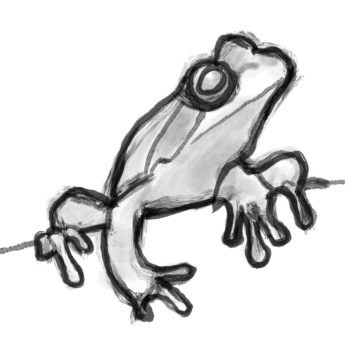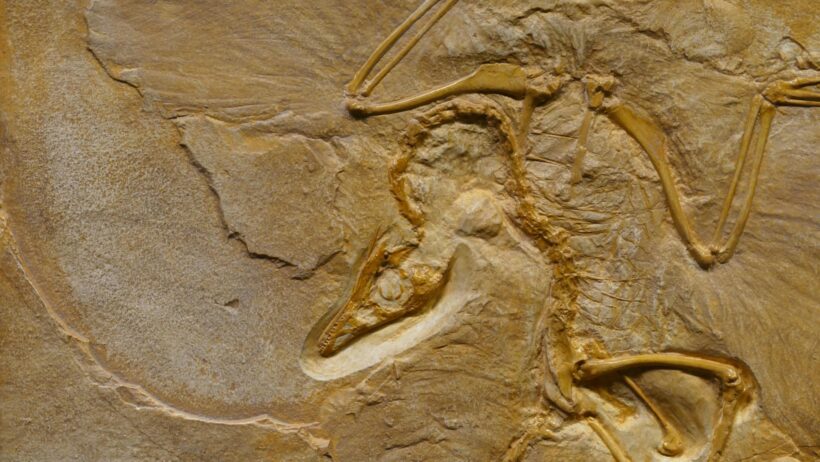Consciousness contains within itself the seeds of its own liberation.
This essay is a bit speculative and references an objective world a lot, something Zen mostly avoids. Just keep in mind Zen teaching generally makes no reference to evolution, there is no need. It is still, however, interesting thinking about how evolution might have both necessitated and set the stage for (Zen) Buddhism’s approach to liberation on our world.
The imprisoned jailer: The origin of self-deception
Evolution is simply our most satisfying explanation for how chemical simplicity can evolve into an array of biological complexity.
Over the deep time of evolutionary development, we have been equipped, I think slowly, with consciousness. It is still unclear how this happened. Evolving species could certainly have benefitted from better information processing, but why must they necessarily experience this? Why does red (in the objective physical sense) lead to the experience of redness, why not merely react as if redness were perceived?
This is one route to the hard problem of consciousness, the problem of how we make the leap from objectively operating brains to subjectively experienced consciousness. Think about it this way. Scientifically we can define red as a specific range (more or less) of light wavelengths. But this does not explain why red appears to us the way it does, redness. Red versus redness. Objective versus subjective.
In this post, I will interact with this only in one sense: that subjective experience is causally influenced by objective reality mediated through the nervous system, and that objective reality is influenced by subjective reality (also through the nervous system). For example, my eye sends information about a rock in the path, perceiving the rock I react by side-stepping it.
These are assumptions, but also (it appears) necessary for a world which is steeped in evolutionary activity that benefits from minds. Evolution requires causality, that one thing can cause a more or less predictable subsequent reaction in another thing. Consciousness can only be used by evolution if it forms part of that causal loop.
I am going to focus on the evolution of our conventional way of being conscious, our mind-style if you will. As stated earlier, there will be one theme: Consciousness contains within itself the seeds of its own liberation.
Evolution is a master of finding and repurposing tools from the environment, differentially favouring those individuals with the best tools and the most skillful usage of those tools. Evolution encountered mind at some point. Perhaps since the very beginning, perhaps with the evolution of more complex life. But, at some point, subjective experience lit up (gradually?). And, it was useful when put to work increasing the reproductive prospects of the minderatti of the earlier Earth.
The awareness of animals
Buddhist cosmology talks of a realm of animals, where beings are too concerned with basic survival to perceive and realize the Dharma (the Dharma at its most basic level is the teachings of the Buddha). And yet, there is already a Buddha in this realm. Mind is, by definition, everywhere awareness goes, it is awareness.
Many would say consciousness is an extra layer on top of this, a kind of self-awareness and self-referential thinking. I would place consciousness as identical with awareness. The internal differentiation of subjective experience makes little sense when seen from an a priori perspective, a perspective unclouded by other perspectives. All is mind. We would do well to have this experience that is impossible not to have. And yet, there is distinctiveness within this mind!
Evolution cheerfully piggybacked on subjective experience and its ability to, somehow, orchestrate the behaviours of a creature. What about our unconscious mind? Is it simply not “good” enough to be have subjective experience, or is it in fact conscious and evolution never bothered to “wire us up” so that we have direct subjective experience of each other. In fact, are all creatures the same subjective entity without the connecting wiring (clearly) to experience our other selves?
Regardless who gets to be conscious, there is one thing evolution can’t prevent. Mind, effectively, jailbreaking itself. We have an effective jailer in our conventional ego which tells us constantly we are separate from all things, and gives us the promise of continuity beyond our frail momentary form. But this construct is only introduced by evolution in (one assumes) “higher” animals. Subjective experience is made to fear itself in service of a web of probability.
Frogs, flies and waffles
Does a frog have an ego? If not, let’s use it as an example. The frog waits patiently on a stone next to a pond, the world tranquil in its awareness. Eventually, a hapless fly buzzes by. *schlup* The fly is lunch. By contrast, a human orders waffles in a cafe, proceeds to read the news on their phone, becoming impatient while waiting. They need to eat to get on with the day ahead. The story of their ego must, compulsively, be told and guarded. The waffles are consumed in haste, without the crisp awareness of the taste of a juicy fly. The frog doesn’t latch onto a story about itself, but humans tend to. The frog is, in this sense, the true connoisseur.
I used the word awareness for both frogs and humans, even though I assumed frogs don’t have an ego. This is important. In Zen, awareness is what it is. There isn’t an ego experiencing something. Things could be said to experience themselves. Experiences just are, they are fundamental. They are what is real (but see my essay on Emptiness, which is roughly about “where experiences come from, what is their foundation and where do they go to”). In humans, the ego is built on top of that, a construct that (in this essay) derives from our evolutionary history, So, the ego is experienced on exactly the same level as the waffle is experienced. But, the experience of the ego may be that of an ego experiencing a waffle, which is of course not what is really happening. What if we simply ate the waffle instead? *schlup*
Into the Goldilocks zone
Buddhist cosmology further refers to the human realm as an ideal place to find enlightenment. Akin to the porridge in the tale of Goldilocks, not too much suffering, not too little (generally speaking). Mind has freedom to pursue questions about itself, motivated by suffering. We have awareness, awareness of awareness, and so on. Mind tries to hold onto mind but just ends up producing more mind in the process. The jailer tries locking away the prisoner, not realizing the door has two sides.
What if, instead, the “solution” has been there written on awareness since the first organisms able to experienced it? What is the redness of red, the chirping of birds, the feel of fabric brushing against your skin each contained the essential teaching (the Dharma)? What if letting self-referential/discriminative thinking fall away, as practiced in Zen Buddhist meditation, reveals our true selves, who then can see this even in their conventional selves?
We were never jailed, the jailor is also freed. All our awareness is allowed to be just what it is, the ego too is simply amongst other awareness (if it is present, it will tend to fade away when not needed). And, a refinement. Every moment, our awareness is made anew. Nothing persists. This includes the ego,
Would we still be subject to the outcomes of evolutionary pressure? Certainly the senses would still be what they are, for example. Enlightenment isn’t liberation from reality, it is liberation from a self-deceiving reality that separates us from all other things, and convinces us that we should every moment give our lives up to scheming instead of being aware of our real existence. An enlightened person is still a person. They are what happens when the fundamental truth of experience hits the frail beings that call themselves human, liberating them. Yet nothing has changed, in a sense.
It took millions of years of progressively elaborating consciousness to finally find that liberation was always right here, its truth scrawled on every thought and sensation. Like life in the primordial seas, the water went unnoticed because it was everywhere. We find we are a brief cherished eddy in the mind of Buddha, where do we go after? Evolution grinds forward, but the prison is empty, the jailer is an occupant and the occupants are free. They flash into and out of being. From there, together, going beyond,
Epilogue
Philosophically inclined readers may note strong currents of Idealism in the post. Some of Zen’s ideas are indeed encountered in other thought. Zen is, however, primarily practical. You can be completely illiterate and otherwise uneducated and still become a Zen master. After enlightenment, a rich philosophy may develop. Before enlightenment, it is best just to practice (primarily meditation). The teachings are, after all, written on all things. Why be attached to thoughts like “Idealism”? Think of this as a teaching, what could it be that they are trying to teach if everything teaches it?
This piece seems somewhat Gnostic, with evolution being some kind of demiurge with humans trying to escape it. This is misleading on at least two counts.
The first is that evolution is neither good, nor evil. It is simply a description of what happens when chemistry self-organizes over time with steady inputs of energy. It is not an entity with beliefs and desires.
More importantly, this is not about an escape from the world, this is about a reclamation of the world just as it is. This is a world of grace, of enlightenment already there, not secret knowledge. To believe secret knowledge is necessary, specifically to the exclusion of non-believers, risks missing the knowledge written on all things, available to all.
Discover more from Blanket Theory
Subscribe to get the latest posts sent to your email.


